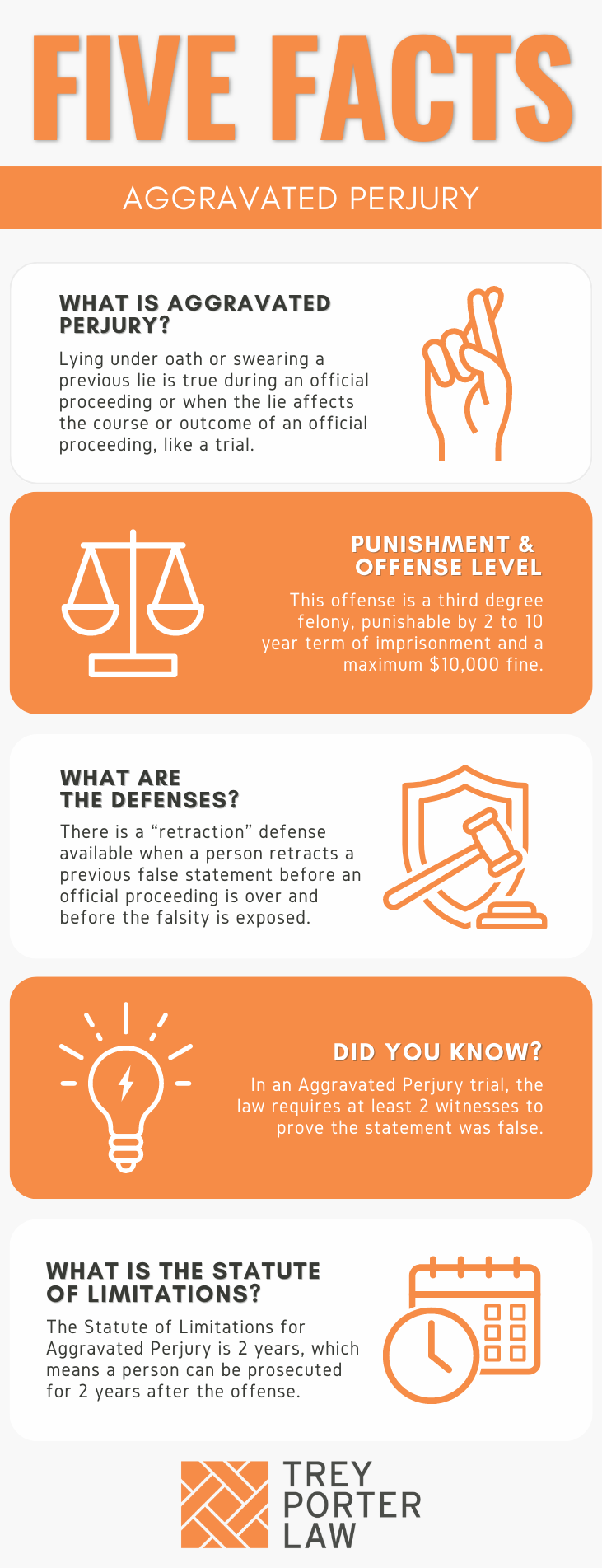WHAT IS AGGRAVATED PERJURY IN TEXAS?
Under Texas law, perjury, becomes aggravated perjury when a person makes a material, false statement under oath in connection with an official proceeding, with the intent to deceive and with knowledge of the statement’s meaning.

- What is a “material” statement? In the context of perjury and aggravated perjury, a statement is material if it could have affected the course or outcome of an official proceeding. In practice, most statements made under oath during an official proceeding have the potential to affect the course or outcome. Utterly trivial falsifications are not considered material.
- What is an official proceeding? An official proceeding is any type of proceeding that “may be conducted before a public servant.” Examples of official proceedings include any court hearing, deposition, divorce proceeding, or testimony before a grand jury.
WHAT IS THE AGGRAVATED PERJURY LAW IN TEXAS?
Tex. Penal Code § 37.03. AGGRAVATED PERJURY.
(a) A person commits an offense if he commits perjury as defined in Section 37.02, and the false statement:
(1) is made during or in connection with an official proceeding; and
(2) is material.
(b) An offense under this section is a felony of the third degree.
Tex. Penal Code § 37.05. RETRACTION.
It is a defense to prosecution under Section 37.03 (Aggravated Perjury) that the actor retracted his false statement:
(1) before completion of the testimony at the official proceeding; and
(2) before it became manifest that the falsity of the statement would be exposed.
Tex. Penal Code § 37.07. IRREGULARITIES NO DEFENSE.
(a) It is no defense to prosecution under Section 37.02 (Perjury) or 37.03 (Aggravated Perjury) that the oath was administered or taken in an irregular manner, or that there was some irregularity in the appointment or qualification of the person who administered the oath.
(b) It is no defense to prosecution under Section 37.02 (Perjury) or 37.03 (Aggravated Perjury) that a document was not sworn to if the document contains a recital that it was made under oath, the declarant was aware of the recital when he signed the document, and the document contains the signed jurat of a public servant authorized to administer oaths.
WHAT IS THE PENALTY CLASS FOR AGGRAVATED PERJURY IN TEXAS?
Aggravated perjury is a third degree felony, punishable by two to ten years in prison.
WHAT IS THE PUNISHMENT RANGE FOR AGGRAVATED PERJURY IN TEXAS?
The punishment range for aggravated perjury, a third degree felony, is between two and ten years in prison, and up to a $10,000 fine.
WHAT ARE THE PENALTIES FOR AGGRAVATED PERJURY IN TEXAS?
As an alternative to prison, a person may be placed on probation after a conviction, or deferred adjudication without a conviction, for up to ten years.
WHAT ARE THE DEFENSES TO AGGRAVATED PERJURY IN TEXAS?
The law provides the affirmative defense of retraction to aggravated perjury. If a person retracts the false statement before the official proceeding is over, and before it is clear the statement will be exposed as false, the person may raise a retraction defense to an aggravated perjury prosecution.
- How many witnesses must testify in an aggravated perjury prosecution? If a defendant charged with aggravated perjury is accused of making a false statement, at least two witnesses must prove the statement was false.
WHAT IS THE STATUTE OF LIMITATIONS FOR AGGRAVATED PERJURY IN TEXAS?
Because aggravated offenses are regulated by the same statute of limitations as their primary, non-aggravated crimes, the limitation period for aggravated perjury is two years. See Tex. Code Crim. Proc. art. 12.03(d).
AGGRAVATED PERJURY IN TEXAS
Aggravated perjury, a third degree felony, is making a false statement in connection with an official proceeding. The State must prove the person making the false material statement had intent to deceive, and knew the misleading nature of the statement. The intent to deceive may be inferred from the circumstances.
TEXAS AGGRAVATED PERJURY COURT CASES
The case law regarding aggravated perjury in Texas illustrates the statute’s application.
In Kmiec v. State, the defendant was arrested for disorderly conduct, assault, and resisting arrest. He identified himself to police, and at the jail, using his brother’s name and information, and pled guilty to resisting arrest under his brother’s name. He was convicted of aggravated perjury, but argued on appeal his statements were not sworn, and the name used was his alias, and thus not false. The appellate court affirmed; the evidence showed the defendant had warrants at the time, his brother’s name was the name he gave to officers, likely so they would not see his warrants, and swore to that name in an official proceeding. 91 S.W.3d 820 (Tex. App—Houston [1st Dist.] 2002, pet. ref’d).












